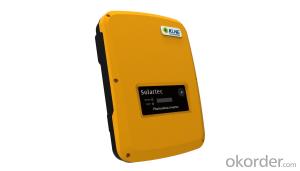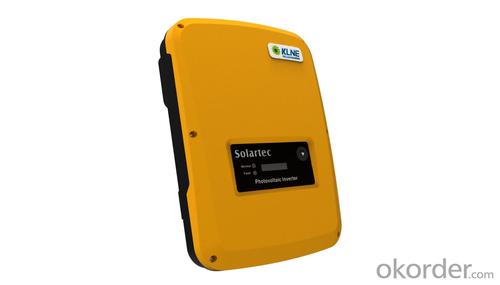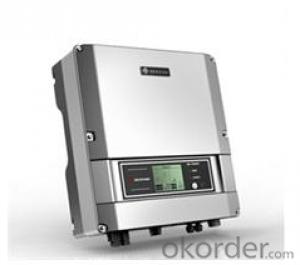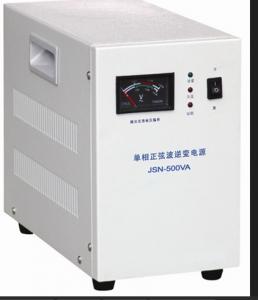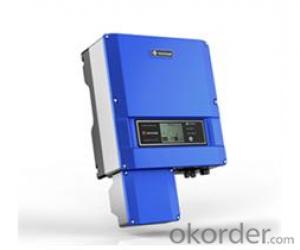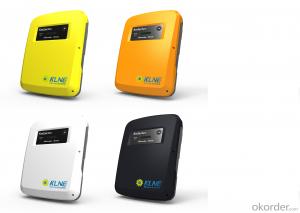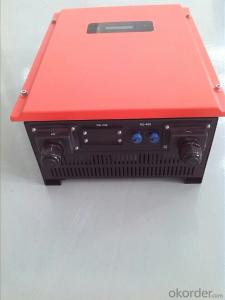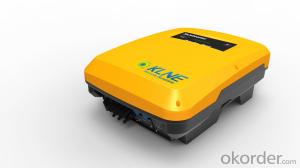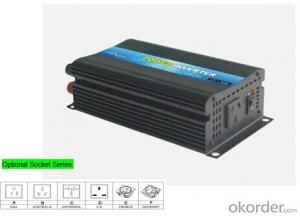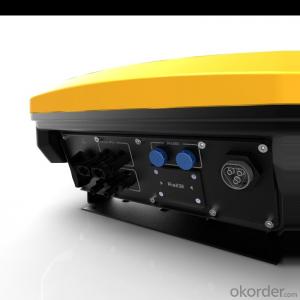200 Amp Solar Inverter Off-Grid Inverter Solo-3000s
- Loading Port:
- China Main Port
- Payment Terms:
- TT OR LC
- Min Order Qty:
- -
- Supply Capability:
- -
OKorder Service Pledge
Quality Product, Order Online Tracking, Timely Delivery
OKorder Financial Service
Credit Rating, Credit Services, Credit Purchasing
You Might Also Like
This system can keep 5 energy-saving bulbs with 15W working for 5 hours per day and a 5W radio working for 8 hours a day. The AC load can keep a 33in color TV (90W) working for 5 hours, a 70W phonograph record machine working for 5 hours, a 200L fridge (180W) working a whole day, a fan less than 60W running for 5 hours, a 300W computer working for 4 hours and a 1000W water heater running for 1 hour.
It can work for 3 successive rainy days.
● System voltage: 48V
● Output: 220VAC/50Hz
● Power: 3000VA
● Box’s dimensions: 600 X 1000 X 600mm
● Net weight: 69kg
Main Accessories | Specifications | No. | Notes |
Inverter | Solo-3000 | 1 | Standard |
PV modules | Polysilicon 100Wp | 16 pieces | Optional |
Storage battery | Lead acid, maintenance-free, 12V/175Ah | 16 pieces | Optional |
Controller | Solo-VS48V/50A | 1 unit | Optional |
PV accessories shelf | Simple type | 1 set | Optiona |
- Q: How does a solar inverter handle variations in battery charge levels?
- A solar inverter manages variations in battery charge levels by monitoring the voltage and state of charge of the batteries. It adjusts the flow of electricity from the solar panels to the batteries accordingly, ensuring that the batteries are charged optimally without overcharging or undercharging. This helps maintain a stable and efficient energy storage system.
- Q: How does a solar inverter affect the overall system performance in different weather conditions?
- A solar inverter plays a crucial role in the overall performance of a solar power system in various weather conditions. It helps optimize the conversion of direct current (DC) generated by solar panels into alternating current (AC) that is used to power homes and businesses. During sunny weather, a high-quality inverter ensures maximum power extraction from the solar panels, resulting in higher energy production and improved system performance. In contrast, in overcast or low-light conditions, a well-designed inverter can still efficiently convert the available solar energy, albeit at a reduced capacity. Moreover, advanced inverters often incorporate technologies like maximum power point tracking (MPPT) to adapt to changing weather conditions, ensuring optimal performance and energy generation regardless of weather variations.
- Q: Can a solar inverter be used for commercial-scale solar installations?
- Yes, a solar inverter can be used for commercial-scale solar installations. Solar inverters are essential components of any solar PV system, converting the DC electricity generated by solar panels into AC electricity suitable for commercial use. They are available in various sizes and capacities, allowing them to accommodate the power requirements of large-scale commercial installations. Additionally, advanced features like grid-tie functionality and monitoring capabilities make solar inverters suitable for integration into commercial-scale solar installations.
- Q: What is the role of a solar inverter in power quality management?
- The role of a solar inverter in power quality management is to convert the direct current (DC) generated by solar panels into alternating current (AC) suitable for use in the electrical grid. In addition to this primary function, solar inverters also play a crucial role in managing and maintaining power quality by ensuring a stable voltage and frequency output, reducing harmonics and reactive power, and providing grid support functions such as voltage regulation and power factor correction.
- Q: What are the advantages of using a solar inverter?
- The advantages of using a solar inverter include the conversion of DC power from solar panels into AC power suitable for use in homes and businesses, the ability to sell excess electricity back to the grid, reduced reliance on fossil fuels, lower energy bills, and environmental benefits such as reduced carbon emissions.
- Q: Can a solar inverter be used with a solar-powered electric gate system?
- Yes, a solar inverter can be used with a solar-powered electric gate system. The solar inverter is responsible for converting the DC power generated by the solar panels into AC power, which is required to operate the electric gate system. This allows the solar energy to be utilized efficiently in powering the gate system.
- Q: Can a solar inverter be used in systems with different module tilts?
- Yes, a solar inverter can be used in systems with different module tilts. Solar inverters are designed to convert the DC power generated by solar panels into AC power for use in the electrical grid. They are compatible with a wide range of module tilts and orientations, allowing flexibility in system design and installation.
- Q: How does a solar inverter impact the overall system reliability?
- A solar inverter plays a crucial role in the overall system reliability of a solar power system. It converts the direct current (DC) generated by solar panels into alternating current (AC) that can be used to power homes and businesses. By efficiently managing the power output and ensuring proper voltage levels, a solar inverter helps maintain the stability and reliability of the system. It also includes protective features that safeguard the system from potential issues like overvoltage, overcurrent, and short circuits. Therefore, a high-quality solar inverter positively impacts the overall system reliability by ensuring optimal performance and protecting against potential faults or failures.
- Q: What is the role of a solar inverter in maintaining system stability?
- The role of a solar inverter in maintaining system stability is to convert the direct current (DC) generated by the solar panels into alternating current (AC) that can be used to power electrical devices. It also helps regulate the voltage and frequency of the AC output to ensure it matches the requirements of the electrical grid. By effectively managing the power flow and ensuring compatibility with the grid, the solar inverter helps maintain system stability and prevents any disruptions or damage to the entire solar power system.
- Q: Generally a large grid-connected photovoltaic power plant will have several inverters
- Inverter, a single failure, does not affect other operations, the impact on the grid is small, high reliability.
Send your message to us
200 Amp Solar Inverter Off-Grid Inverter Solo-3000s
- Loading Port:
- China Main Port
- Payment Terms:
- TT OR LC
- Min Order Qty:
- -
- Supply Capability:
- -
OKorder Service Pledge
Quality Product, Order Online Tracking, Timely Delivery
OKorder Financial Service
Credit Rating, Credit Services, Credit Purchasing
Similar products
Hot products
Hot Searches
Related keywords
